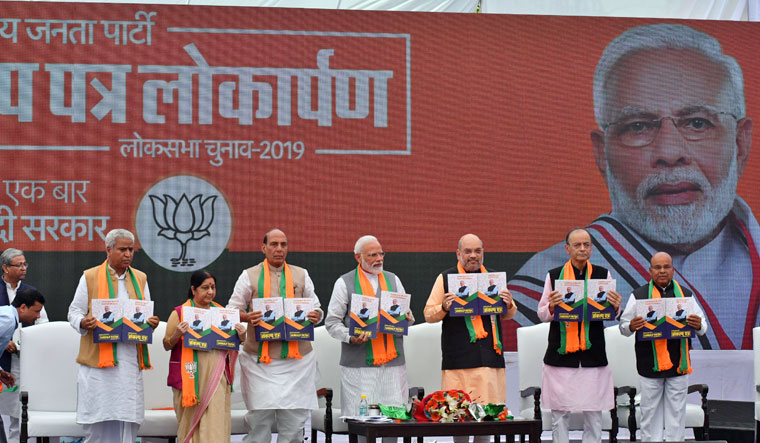If the Congress manifesto, released last week, identified job creation as its top priority, the BJP manifesto released by Prime Minister Narendra Modi and party chief Amit Shah on Monday put national security right at the top, while promising to make India a developed country by 2047. In 2014, the national security had found mention at the fag end of the 46-page BJP manifesto.
A comprehensive section on national security in the BJP manifesto is followed by a section with focus on farmers, the two major poll planks the ruling party trying to encash during this election season. The elaborate 46-page manifesto talks about zero tolerance to terrorism which will be done by giving a free hand to the security forces, the party manifesto said. In the same section, the BJP chief Amit Shah said the party was committed to weeding out infiltrators. The manifesto also promises to implement National Register of Citizens to the rest of the country.
This is where the BJP and the Congress differ sharply. The Congress had offered to review the controversial AFSPA Law if it was voted to power. The Congress had also offered to withdraw the Citizenship (Amendment) Bill, but the BJP manifesto showed its commitment to passing the Bill.
The Congress manifesto focussed on dialogue in resolving the Jammu and Kashmir problem, and also promised to review the Disturbed Areas Act. However, the BJP reiterated its demand of abrogating Article 370 and even removing Article 35 A, which it said was discriminatory to the non-residents and women of the state.
read more
- Karnataka: How R Ashok's attempt to mock DK Shivakumar's 'CM chair dream' backfired
- BJP slams Uddhav Thackeray for questioning Modi govt over attacks on Hindus in Bangladesh
- In maiden speech, MP Priyanka slams Centre over Adani row, accuses BJP of weakening Constitution
- One year of MP govt: Chief Minister Mohan Yadav pledges better use of resources to bring prosperity
Both the parties have tried to woo the farmers in their manifesto. The Congress had promised to give Rs 6,000 per month to 25 crore poor, which will cost around Rs 17.5 lakh crore in five years. The Congress was billing the NYAY scheme as a gamechanger in the polls.
Home Minister Rajnath Singh, also chairman of the manifesto committee, said Prime Minister Narendra Modi wanted to extend the benefit of the Kisan Samman Nidhi Yojna. This scheme provides Rs 6,000 in a year to the farmers owning not more than two hectares. On Modi's insistence, the BJP has now removed the cap on the beneficiaries and decided to extend it to all the farmers.
The competitive politics to get the support of the farmers across the country is aimed at wooing the largest constituency in the country. The BJP manifesto termed Sankalp Patra—which means a promise document—aims to provide Rs 25 lakh crore investments in the rural areas. The BJP also promised to give pension to small and marginal farmers after they reach an age of 60 years. The same benefit will also be extended to small shopkeepers. Even an interest free loan for the first year will be provided for upto Rs one lakh to farmers.
The BJP promised to set up a separate ministry for water, unifying the water management functions to address the issue of water crisis holistically. Modi recalled his visits to Tamil Nadu, which is most likely to face water crisis, and said India needs to look at the future to meet its water needs.
The Congress had also promised to present a separate Kisan Budget.
Another key highlight of the BJP manifesto was the promise to invest Rs 100 lakh crore in the infrastructure sector by 2024 to change the face of the country.
The BJP introduced a new feature in its manifesto by listing 75 promises that it will fulfil by 2022 when India would celebrate 75 years of independence.
Speaking during the manifesto release function at the party headquarters, Modi said, like Gandhi turned the quest for freedom as a jan andolan, his party will turn development as a movement so that when India celebrates 100 years of independence in 2047 it will be a developed nation. “The foundation to turn India into a developed country will be laid between 2019 and 2024 with an investment of Rs 100 lakh crore in infrastructure.”
Finance Minister Arun Jaitley said, “this sankalp patra was not prepared with tukde tukde or Ivy league mindset but through nationalistic minded, and is rooted in ground realities.” The jibe was aimed at the Congress as it had promised to dilute AFSPA and remove the sedition law which the BJP said was aimed at helping the separatist forces.
The BJP reiterated its promise to build Ram Temple by exploring all possibilities within the framework of the constitution and all necessary efforts to facilitate the expeditious construction. The party also promised to clean Ganga, promote Yoga, conserve local languages, and even promised to present matters of faith in proper manner before the Supreme Court like in the case of Sabarimala.



